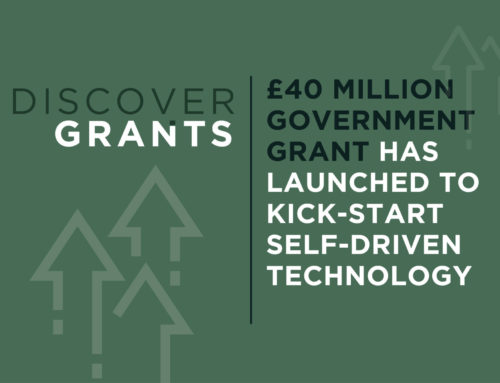Common mistakes made when applying for grants for charities in the UK
Grants for charities in the UK have never been more competitive than now. The COVID-19 pandemic has led to a steep increase in businesses searching for grants for charities and emergency funding. The pandemic has had a considerable impact on all aspects of business, but charities have been hit particularly hard.
As more charities are applying for grants and funding, it’s vital that your application stands out against your competitors. Here at Discover Grants, securing grants for businesses and charities is what we do best. Below are some of our top tips that can help you find success with your next grant application.
Before you apply…
Before you apply for grants for charities in the UK, there are certain things you need to be aware of. To register with the Charity Commission, you’ll need to prove that your income will be over £5,000 each year. The exception to this, however, is if you’re a charitable incorporated organisation (CIO). In this case, you need to register your exact income.
What grants for charities in the UK are available?
The funding available to charities in the UK will depend on each individual organisation. However, grants for charities in the UK include:
Government funding
Some UK charities are funded by central or local government. Charities may receive this funding directly or through a funding body, such as the Arts Council.
In some cases, charities may bid for contracts to provide services to the public. For example, some charities provide services including:
- Refuges for victims of domestic violence
- Sheltered housing and care for the elderly
- Sports activities for disadvantaged children
- Support and advice for people looking for work
- Delivering food to housebound people.
However, to bid for this type of funding, your charity must:
- Only carry out activities that fall within your organisation’s purpose
- Remain independent of government
- Make decisions in line with your duties as trustees
- Can afford to deliver the services as stated in the contract.
Grants from private organisations
If you’re searching for grants for charities in the UK, you may be interested in private funding opportunities. For example, the National Lottery Community Fund offers grants and funding to charities, such as:
- National Lottery Awards for All England
- National Lottery Awards for All Wales
- National Lottery Awards for All Scotland
- National Lottery Awards for All Northern Ireland
- Reaching Communities England
- Empowering Young People
- Community Led
- Improving Lives.
These are just a few examples of the different grants for charities in the UK. The National Lottery Community Fund offers grants for projects under £10,000, as well as longer term projects over £10,000. The funding you’re eligible for will depend on your organisation and the project you want to deliver.
In some case, larger charities offer grants and funding to other charities.
Advantages of grants and funding
Before you apply for grants for charities in the UK, you might be wondering how it will benefit your organisation. Here are the advantages of applying for funding for your charity:
-
Grants don’t need to be repaid
Grants for charities in the UK are an attractive funding option for non-profit organisations. This is because unlike loans, grants don’t need to be repaid. Essentially, you’ll be receiving ‘free money’ from the funder.
-
Increase belief in your charity
When your charity is awarded funding, this will increase belief in your charity’s mission and objectives. By selecting your charity for funding, the funder has shown that your idea(s) are worth investing in.
-
They boost credibility
Once you’ve secured one grant for your charity, it makes it easier to find more funding going forward. This is because other funders will know that you’re a good candidate for their grants.
The grant application process: How to apply for charity funding
Now you know about different grants for charities in the UK, it’s time to look at the grant application process.
-
Get in touch with the awarding body
Before you apply for charity funding, you should get in touch with the awarding body. This will give you an idea of your chances of submitting a successful application. You can also use this time to go over any aspects of the opportunity that you’re unsure of. For example, if you have any additional questions, this is a great opportunity to ask the funder.
It’s also beneficial to secure a contact at the awarding body. This will give you an opportunity to track your application should there be any problems. For example, if you require an update on your application, you can call your contact to find out more.
-
Carefully read the grant specification and objectives
To secure a grant for your charity, it’s important that you read the specification – carefully and thoroughly. This will help you understand the opportunity in more detail, as well as the funder’s aims.
It’s also important that you reference the funder’s specifications throughout your funding proposal. For example, if the funder aims to positively impact the local community, explain how your charity’s project will do so. This will strengthen your proposal and increase your chances of success.
Grants for charities in the UK often have eligibility criteria that you need to meet before you apply. Carefully reading the grant’s specifications and objectives will help you assess whether an opportunity is right for your organisation.
-
Start planning and apply early
Grants for charities in the UK are often highly competitive. Depending on the opportunity, it can take weeks, or even months, to apply. To increase your chances of success, you should apply as early as possible.
This is especially important as some grants are only open at certain times of year. If you miss the deadline for submitting your application, you could be waiting awhile for your next opportunity.
To help with your time management, you could make yourself a checklist of requirements. That way, you can ensure that you consider every aspect of the application process, including:
- Submission deadline date and time
- Format of the proposal
- The number of questions that need to be addressed and their word count/page limit
- What additional documents need to be attached
- The number of copies required
- How to submit. For example, via portal, email or hardcopy.
-
Create a funding plan
Regardless of the opportunity, funders want to know how and where the money will be spent. To ensure that there is no doubt, you should create a funding plan as part of your application.
In your funding plan, you should outline exactly how you will benefit from the funding. You should also explain how this will benefit the funder, as this will increase your chances of success. Make sure to include as much detail as possible. While the funder might know about your organisation, there are no guarantees. So, avoid complex jargon and use laymen’s terms wherever possible.
Here are some questions that you should consider when creating your funding plan:
- What is the nature of your charity?
- What are you offering the community?
- Who are you aiming to help?
- What is your mission?
- Do you have any advantages over other organisations?
- What needs will your charity fulfil?
-
Ask for feedback
If your grant application is unsuccessful, you should ask the funder for feedback. Especially if you have limited experience with applying for grants for charities in the UK. This will help you learn from your mistakes and improve your application for the next opportunity.
Remember, don’t be disheartened if you face rejection. You’re unlikely to win every funding opportunity that you apply for. All that matters is that you try again!
Common mistakes
It’s important to discuss the common mistake that are often made in charity grant applications. If you’re not seeing success from your current applications, this could be down to:
-
Unrealistic projects
Applying for grants for charities with an unrealistic project is a common mistake. You’d be surprised how many make it. When you apply for projects that you’re unlikely to win, you’re just wasting your time and resources. Just think about what you could be spending those on instead.
Another common mistake correlating to this is demanding too much money that exceeds the funders abilities. Projects must be realistic, meet a need and be priced appropriately and accordingly. Ask yourself:
- Does my work fit the funder’s criteria well?
- Is the grant large enough to meet my needs?
- Is the grant for a long enough time period to meet my needs?
- Do I have enough time to complete and submit a thorough application?
- Is there another opportunity that’s better suited?
-
Rambling, incoherent applications that have no substantial evidence of a need
Sending off an application that rambles is never going to do well. You might mean well, but your application should have a purpose. You need to persuade the funder that they should give you their money.
Applications that are merely trying to graft money from funders and have no real need will be rejected. You must demonstrate that there is a need for your project and that you intend to meet it. Providing a long-term, sustainable solution to a problem is preferred.
If you’re struggling to answer the funder’s questions, there’s a good chance that this isn’t the opportunity for you. If that’s the case, you should look for another funding opportunity. After all, there are plenty of grants for charities in the UK to choose from!
-
Trying to make your project fit an opportunity
One of the biggest mistakes is trying to make your project fit funding criteria that simply doesn’t match. You shouldn’t try and edit your project to suit a funding opportunity. Instead, you should try to find and match a funder to your aims and objectives. This will then give you a better chance of being successful.
-
Submitting your application in the wrong format
You should answer the questions asked by the funder and upload the documentation in the requested format. If they state that they don’t accept applications via email, don’t send the application by email. If they’re asking for a video, provide a video. A funder will specify what they require in the documents. If they don’t, simply get in contact and ask for clarification. These are just silly errors that could easily be avoided by reading what the funder specifies.
You want to avoid these common mistakes that many charities make when applying for grants. Funders want to see a well thought out project that is meeting a need. A funding writer can help optimise your chances of success. They are well versed in the art of writing grant funding proposals. They know how best to convey your business to a funder, and what they’re looking for. It may be worth looking into working with one to help improve your chances of success.
8 tips for how to write successful grants for charities in the UK
-
Plan and research
The power of planning should never be underestimated. Applications should be well planned in advance, allowing plenty of time for any delays along the way. You should do your research and get your affairs in order in preparation.
Take the time to understand the funder you’re applying to. Make sure that what you’re applying for is aligned with what the funder requires. To do this, you should carefully read their specifications and objectives. If you don’t think you meet their aims, it might not be worth applying for the grant. It takes a lot of time, effort and resources to produce a funding application. If you’re unlikely to win, these might be better spent elsewhere.
However, you should do more than read the grant’s specifications and objectives. You should also familiarise yourself with the funder’s history, aims, objectives, people and brand. When you come to produce your proposal, you can use this information to show that you’re a good fit.
Once you decide to go ahead with an application for grants for charities in the UK, make a note of the:
- Submission deadline – date and time
- Format of submission
- Form of submission
- Number of pages or words for each question
- Attachments required
- Additional documents
- Number of copies of an application.
-
Use an appropriate writing style
When you’re applying for grants for charities in the UK, it’s important that you use an appropriate style of writing.
Generally, an application for charity funding will be more emotive than a business grant proposal. Unlike with business funding, writing a proposal for a charity grant is more like storytelling. You can use heartfelt, personal examples to convince the funder and, hopefully, pull on their heartstrings.
With this type of proposal, social value is the most important factor. You need to explain how your organisation will positively impact society in some way. Funders are more likely to offer financial support to those that are going to make a difference. It’s also important that you demonstrate how important the funding is to your goals.
To make your proposal more emotive, consider these questions:
- What need is your charity meeting?
- Who will/does your charity help?
- What would happen if your charity didn’t exist?
-
Use evidence
Evidence in the form of facts and statistics are required for any successful grant for charities application. You should back up what you’re writing with hard evidence – be specific. A good way to remember this is by using the P.E.E method in your response.
- Point
- Evidence
- Explain
Using this method when completing your application can help you keep focused on your point. Any statement or point you make should then be followed with evidence such as facts or stats. Then, once you have provided the evidence, you can explain how it’s relevant and why you’ve included it. This can help you bid for funding efficiently.
However, that doesn’t mean that your application needs to be cold and clinical. In fact, when you’re applying for grants for charities in the UK, you can use personal evidence too. Depending on your organisation, you might be able to use real stories from real people. By demonstrating the impact of your charity with real-life case studies, the funder can see who’s benefiting from your work. This will definitely help to pull on the funder’s heartstrings and, ultimately, increase your chances of success.
-
Stay focused
The art of persuasion. You want to clearly demonstrate that you are providing a practical solution to a problem that is meeting a need. Successful grants for charities applicants will include achievable and measurable outcomes of the project. Ideally, you want to provide a long-term solution to the problem, offering the funder value for money.
-
Project costs
Successful applications for grants for charities should demonstrate that your organisation is well versed in cost-effectiveness. Funders want to know that you can manage money, and more importantly, that their money is in safe hands. You could include past projects where you have managed the cash-flow, helping demonstrate your capabilities.
When applying for grants for charities, you may want to include the following in your application:
- A fully costed project.
- The degree of financial skills and knowledge within your organisation.
- Your organisation’s annual income and expenditure.
- Up to date current accounts.
- Previous annual report.
- A business plan for the implementation of the project.
- A cash flow analysis for the use of money.
- The financial controls and safeguards you have in place.
-
Use the correct format
It’s important that your funding proposal is submitted in the correct format. If the funder is looking for a specific word count or page limit, you need to stick to this.
That being said, don’t waffle just to fill the word count. The funder has set this for a reason, so you should use this to guide your response. If you’re struggling to reach the level of detail required, you might need to reconsider the opportunity. You’re unlikely to secure the funding if your proposal if full of buzz words and “fluff” language.
-
Proofread, proofread, proofread!
This next tip is important for all grant applications, no matter what opportunity you’re applying for. When you’re applying for grants for charities in the UK, it’s important that you proofread your proposal. Then proofread it again!
The funder won’t be impressed if you submit a proposal full of spelling mistakes and grammatical errors. Your application needs to show the funder how much you care about the opportunity. However, a sloppy proposal suggests the opposite. The funder might even assume that you don’t care enough about the opportunity to submit a polished proposal.
Let’s think about it from the funder’s perspective. You’ve got two grant applications in front of you. Both are pulling on your heartstrings, but one is littered with small, avoidable mistakes. On the other hand, the other grant proposal is well-written and error-free. If you were the funder in this situation, who would you award the funding to?
That being said, we understand how difficult it can be to proof your own work. Applications for grants for charities in the UK are lengthy, so it’s easy to overlook small mistakes. To combat this, you could ask someone else to proofread your proposal for you. A second pair of eyes is likely to pick up mistakes that you’ve missed. So, you can rest assured that your funding application is completely error-free.
-
Don’t give up
You’re unlikely to win every funding application and that’s ok. If you’re unsuccessful, you can ask the funder for feedback. This will help you improve for next time, increasing your chances of securing funding for your charity.
It’s important that you don’t let rejection hold you back. If you’re unsuccessful, don’t be disheartened – get back out there and try again. There are plenty of opportunities across the UK and your perseverance will eventually pay off.
To sum up…
Now you know what grants for charities in the UK are available, as well the advantages of securing one. To increase your chances, you should plan your application early, research the funder and use evidence to support your claims. Remember, with charity funding, you can use emotive storytelling to pull on the funder’s heartstrings. If you do this, you’re more likely to win funding for your charity.
Need support?
If you’re overwhelmed by all the grants for charities in the UK, Discover Grants can help. We can help you find the right opportunity for your business, saving you time and resources. Watch a demo on how Discover Grants can help you secure UK grants for charities or register to get started.
Need help writing a grant application?
If you’ve found a charity grant funding application that you want to go for – send it our way! Our Grant Consultants will take care of the rest. They’ll provide you with a full grant writing breakdown and let you know if they need anything further from you. Whether it’s a cash grant for small businesses, start-up business grant or council business grants, they can even submit the final application on your behalf.
Our Grant Tracker service is now open and hosts all the latest grant opportunities in the UK from 1,500 data points. Opportunities are manually tracked, enabling for accurate keyword labelling, optimising your search for the perfect grant.
Sign up today!
Find more helpful tips and advice in our blogs. We cover topics including:
- How a Grant Writing Consultant can help your business
- Innovate UK grants
- Start-up business grants
- Business grants in the UK
- How to apply for a government grant
- Working with Grant Writers
- Bidding for funding
- Council business grants
- Government funding
- Grant writing help
- And many more.





